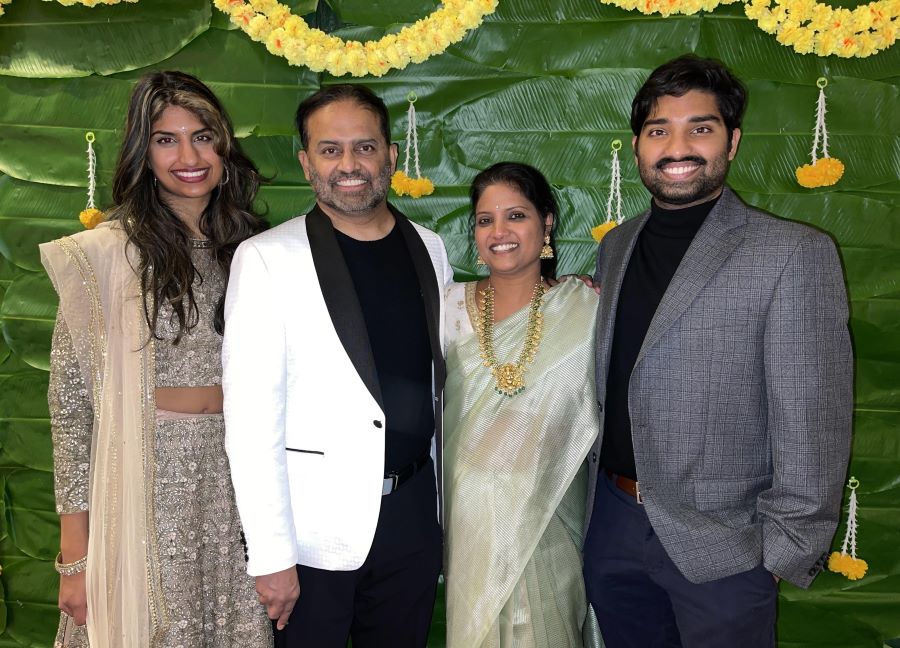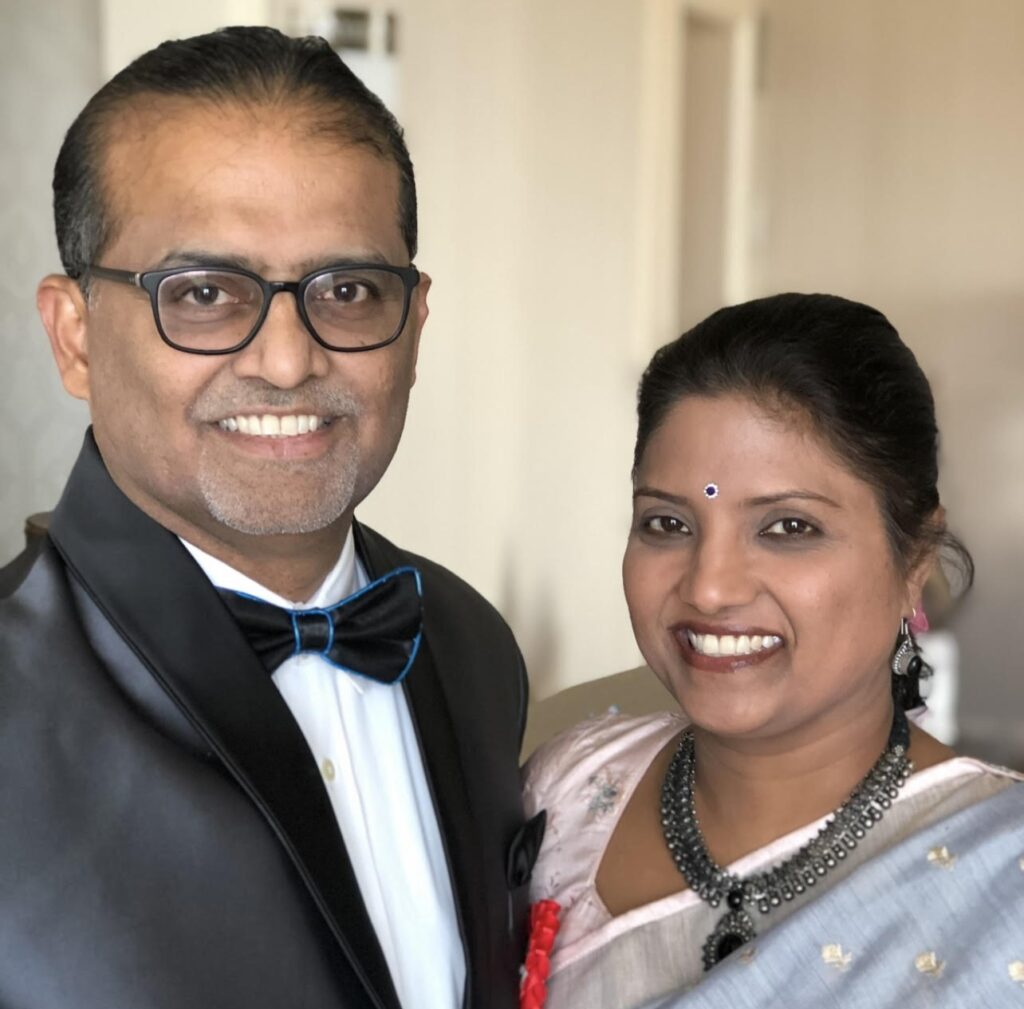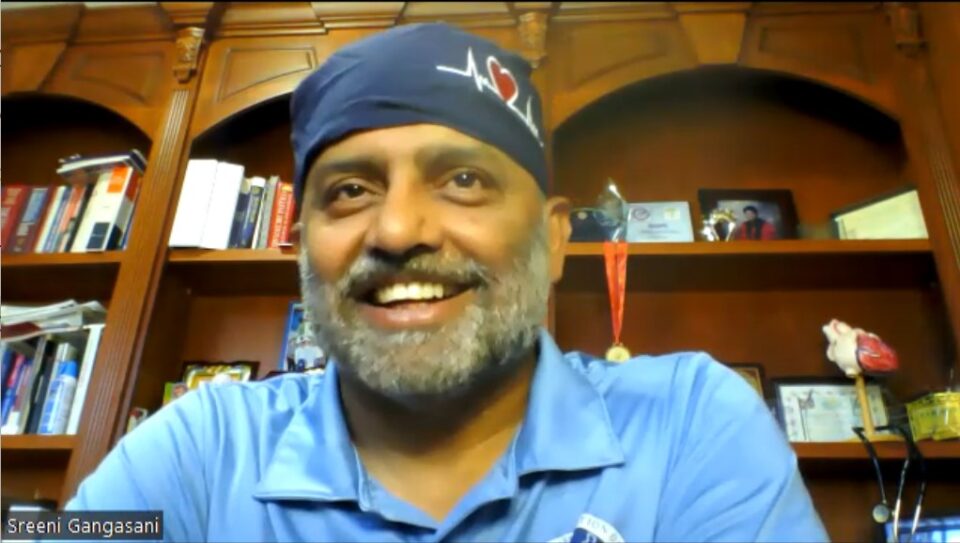BY VEENA RAO
In a recent Zoom conversation, Atlanta area cardiologist Dr. Sreeni Gangasani shared insights into his life journey and the motivations that propelled him into the field of medicine. In an extensive Q&A with NRI Pulse, he also spoke about all things related to heart health (scroll down for Q&A).
Growing up near Hyderabad, India, Dr. Gangasani’s early exposure to healthcare came from his grandfather, who, while not formally trained as a physician, provided medical assistance to those in need in his native village. These childhood memories left a lasting impression, inspiring young Sreeni to consider a career in medicine.
It was his mother who recognized his potential, telling him, “Your personality is what it takes to become a doctor.” Encouraged by her words, he embarked on his educational journey.
Dr. Gangasani’s educational path was far from ordinary. He attended the prestigious AP/Telangana Residential school in Sarvail, established under the leadership of P.V. Narasimha Rao, the former Chief Minister of the state. This institution selected the top students from various districts, fostering healthy competition and motivating Dr. Gangasani to excel academically.
After completing his MBBS with gold medals, Dr. Gangasani’s pursuit of excellence led him to the United States, where he undertook further medical training. He began his residency in 1994, specializing in cardiology after three years of internal medicine. Eventually, he settled in Atlanta in 2000 and established himself as a prominent cardiologist.
Besides his clinical work, Dr. Gangasani has been actively involved in various professional roles, including serving on the Georgia Composite Medical Board, where he gained valuable insights into healthcare governance. He also balances his responsibilities as a husband, father, and board member while remaining dedicated to his practice.

Reflecting on his journey, Dr. Gangasani credits his family, especially his supportive wife, for enabling him to manage multiple responsibilities. With his son pursuing a medical career and his daughter successfully navigating college life, Dr. Gangasani’s dedication to his profession continues to inspire the next generation.
Dr. Gangasani’s inspiring journey from a thriving medical career to becoming an advocate for cardiac health and community service began in Atlanta, Georgia, where he initially focused on his private medical practice. After settling his family and children into their new life, he gradually became more involved in community organizations, particularly the Georgia Association of Physicians of Indian Heritage (GAPI).
As Dr. Gangasani deepened his involvement with GAPI, he took on leadership roles, ultimately serving as its president in 2010. During his tenure, he spearheaded the establishment of a volunteer clinic for GAPI at the Global Mall, where he has since served as the clinic’s director for 13 years. The clinic provides crucial medical services to those without insurance, including visitors from India.
However, Dr. Gangasani’s commitment to community service did not stop there. He continued to rise in leadership roles, becoming a director and a Board of Trustee member of AAPI (American Association of Physicians of Indian Origin). He even served as the convention chair twice, in Atlanta in 2019 and in 2021.

In 2019 and 2020, Dr. Gangasani organized the Global Health Summit in Hyderabad, India, further solidifying his commitment to global healthcare initiatives. His dedication to the medical field and his community culminated in his election as the Treasurer for AAPI, one of the largest physician organizations in the United States, representing nearly 100,000 residents, fellows, and practicing physicians.
One of Dr. Gangasani’s main objectives is to raise awareness about the heightened risk of sudden cardiac death among South Asians. He aims to encourage proactive healthcare practices and risk factor management within the community. With a focus on education and prevention, he hopes to decrease the alarming number of cardiac-related deaths among South Asians in the United States and India.
As Dr. Gangasani looks ahead to the next decade, he envisions a future where he continues to serve as a leader, educator, and advocate for cardiac health and community welfare. His commitment to making a difference in the lives of countless individuals, whether through his medical expertise or community initiatives, remains unwavering.
Debunking myths about heart health
In this extensive Q&A, Dr. Sreeni Gangasani spoke to NRI Pulse about all matters related to heart health.
What are the most common heart-related health issues people should be aware of?
The most common cause of death related to heart health is a heart attack or myocardial infarction, leading to heart muscle damage, heart failure and sometimes leading to cardiac arrest. Heart disease with blockages in the arteries is a significant contributor to cardiac arrest and heart-related deaths. While there are other factors at play, blockages in the heart arteries are the most prevalent concern.
What are some common misconceptions or myths about heart disease?
One common myth is that if you lead a healthy lifestyle, you won’t have a heart attack. Additionally, some people believe that having a normal stress test means they are immune to heart attacks. It’s essential to address these misconceptions and educate individuals about the complexity of heart disease.
Why should someone with a seemingly healthy lifestyle see a cardiologist?
Even individuals with healthy lifestyles can develop heart issues. For instance, research has shown that young military personnel who died in wars had plaque buildup in their arteries. Some risk factors are controllable, such as high blood pressure, diabetes, high cholesterol, smoking, and diet. However, factors like age and family history may contribute to heart disease risk. Therefore, seeing a cardiologist can help assess your individual risk and take preventive measures.
How important is early detection and prevention in managing heart health?
Early detection and prevention are crucial in managing heart health. Plaque can develop in arteries even before symptoms appear, and heart attacks can occur with less than 50% blockage. Identifying risk factors and plaque buildup early through tests like calcium scoring or CT angiograms allows for proactive lifestyle changes and medical interventions that can significantly reduce the risk of heart attacks.
What should someone do if they have a high calcium score indicating plaque buildup?
A high calcium score indicates the presence of plaque in the arteries. In such cases, lifestyle changes become critical. This includes further lowering LDL cholesterol levels (usually below 70), taking medications like statins to stabilize plaque and reduce clot formation, and possibly using aspirin to reduce clot risk. These measures can substantially decrease the likelihood of a heart attack.
How much does a high calcium score increase the risk of a heart attack?
A. While having plaque (as indicated by a high calcium score) increases heart attack risk, the actual risk varies among individuals and is generally not as high as some may think. The risk can range from 1% to 5%, depending on other risk factors. However, through medications, lifestyle changes, and preventive measures, we can reduce this risk to less than 1%, significantly improving overall survival and health outcomes.
What dietary advice do you have for vegetarians, especially Indian vegetarians?
Indian vegetarians may face challenges in obtaining sufficient protein in their diet. While lentils and other legumes provide some protein, it’s crucial to ensure a well-balanced diet. Including a variety of fruits, vegetables, and plant-based protein sources can help meet protein needs. While it might be more challenging compared to meat-based diets, there are plant-based protein options available in the form of tofu, tempeh, and plant-based protein products. Overall, it’s essential to assess your diet and find ways to incorporate adequate protein from various sources.
What kinds of exercises are beneficial in maintaining heart health?
Exercise is crucial for heart health, with regular physical activity helping to burn calories and improve overall cardiovascular function. The timing of exercise is more important than the intensity. You don’t necessarily need high-intensity workouts. Instead, aim for consistency, like walking at your own pace for 30-45 minutes a day or achieving 10,000 steps daily. This level of activity can lead to significant improvements in overall health. Tracking your steps using smartphone apps or wearable devices like the Apple Watch can help you stay motivated and set goals. Whether you prefer walking, using a treadmill, or elliptical training, it’s essential to find an exercise routine that works for you.
Is there a relationship between gut health and heart health, and can you improve gut health to protect your heart?
Yes, there is a connection between gut health and heart health. Poor gut health can lead to inflammation and affect the absorption of nutrients, potentially contributing to higher cholesterol levels and plaque formation in arteries. Maintaining a healthy gut microbiome is essential. While probiotics and probiotic-rich foods may help, it’s not necessary to take them regularly unless you have specific gut issues. Eating a balanced diet that includes fiber-rich foods, fermented foods, and avoiding excessive consumption of processed foods can promote better gut health and, in turn, support heart health.
What are the symptoms of a heart attack, and what should people do if they suspect they’re having one?
Common symptoms of a heart attack include chest heaviness or tightness, which may feel like someone is sitting on the chest. Other symptoms can include shortness of breath, pain radiating to the left arm or back, and sweating. Symptoms may vary from person to person. If you suspect you’re having a heart attack, it’s crucial to seek immediate medical attention by calling emergency services. Early intervention can make a significant difference in the outcome. It’s better to err on the side of caution and get evaluated promptly if you experience these symptoms.





